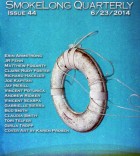Even in the apocalypse, the grass is always greener, huh?
Boys will be boys, right? No, but seriously: I liked the idea that during the apocalypse, the trait that would really catch the eye of a married person, the thing that would be so unbearably alluring wouldn’t be witty dialogue, a glance at a cocktail party, or a low-cut dress. The most alluring thing would be, quite simply, health. In a world where everyone is ravaged and everyone is starving, the biological signifiers of health and fertility—flushed cheeks, dewy skin, shiny hair—are rarer than ever, and attraction/reproduction becomes a matter of life and death for the entire human race. Forget about blush and mascara: obvious physical health is what would really kick the animal instinct into overdrive.
To be honest, it wasn’t until the second or third time I read this that I fully realized it was in the second person. It’s very effective here. What made you go this route?
Thank you! I love the second person in flash fiction because I think it saves so much time. It’s like a person coming up to you and being like, “I don’t care what you look like, the cameras are rolling, let’s start.” I used it here because I liked the immediacy of second person set against the massive horror of the apocalypse. There’s something weirdly cozy about it. Plus, I like a good guilty second person protagonist. I like the idea of embroiling readers in a little bit of that self-loathing.
The world is very quickly realized without any unnecessary description. That being said, I’m still curious: Is this taken from something larger? If not, can you see yourself returning to these characters?
Mostly, the lack of scene comes from the fact that this is the capital “A” Apocalypse and I think we all have an idea of what that would look like. In the story, once you realize the world is ending and people are raiding pharmacies, I hope you can just fill in a lot of blanks. I don’t need to tell you that people have “desperate, hunted looks in their eyes” or whatever. I do emphasize the gunfire a lot; I imagine there’s some sort of massive, corrupt government/army breakdown taking place.
The piece originated last fall, when I tried to write a flash fiction chapbook about female celebrities facing the apocalypse. So I had Britney Spears drowning in a worldwide flood, Audrey and Katherine Hepburn facing cannibalism, Kate Moss in a bunker, and so on. As I grew bored thinking about famous, beautiful women to write about, I thought: what if I just used a stand-in for all beautiful women? The Archetype. Eve. What if she suddenly appeared in the apocalypse, glowing and untouched by the destruction of the earth?
My favorite part of the story comes in the middle. The man’s description of his wife and how horror has carved her into a stranger feels so absolutely perfect and true (albeit awful) that I wondered if this isn’t closer to how people would really act under these circumstances. This guy doesn’t want to be a hero at all, and I find that fascinating. Did you worry at all that he might come off as unlikable?
His un-likeability wasn’t something that worried me because—and maybe this is the second person talking—I believe that his situation is, in a sick way, understandable. Don’t get me wrong, he’s obviously being a terrible husband, but he’s been trapped in a filthy house with a feverish newborn and a wife who’s quickly losing her grasp on reality for weeks, maybe even months. He’s malnourished. He’s terrified. The AC doesn’t work. His next-door neighbors were rotting in their home for days (before the new next-door neighbors gave them that proper backyard burial) and he could probably smell them. This is a world in which anyone and everyone is on the verge of going insane, and in some way that sort of takes likeability out of the question.
I did worry about the how to present the wife; I didn’t want her to be this ugly harpy who nags her man until he finally leaves her for a hotter chick. The wife’s big but understandable failing is that she’s become blinded by her own grief. In this world, she’s actually incredibly lucky—who still has their husband, their child, and their house during the apocalypse?—but her voice is still that funereal bell that won’t shut up. She can’t take it, and dealing with someone who simply cannot deal is an incredibly exhausting process. At some point you want to be like, “NO ONE ELSE CAN DEAL WITH THE APOCALYPSE EITHER. YOU’RE NOT THE ONLY ONE WHO’S AFRAID.” It’s not terribly empathetic and it’s not fair but again, it’s the apocalypse, the social mores are totally different here.
Do you think this guy will ever get acetaminophen for his child?
I’m deeply saddened to report that all the pharmacies in a twenty-mile radius have been completely cleaned out. I genuinely hope this guy can find a few more sources of vitamin C for his poor baby’s immune system, but I gotta say, things are looking bleak for everyone here. Except the new neighbor—I have a feeling he’s a survivor. He’s got that apocalypse skill set: the knowledge of when to joke about the living and when to bury the dead.



 The core workshop of SmokeLong Fitness is all in writing, so you can take part from anywhere at anytime. We are excited about creating a supportive, consistent and structured environment for flash writers to work on their craft in a community. We are thrilled and proud to say that our workshop participants have won, placed, or been listed in every major flash competition. Community works.
The core workshop of SmokeLong Fitness is all in writing, so you can take part from anywhere at anytime. We are excited about creating a supportive, consistent and structured environment for flash writers to work on their craft in a community. We are thrilled and proud to say that our workshop participants have won, placed, or been listed in every major flash competition. Community works.